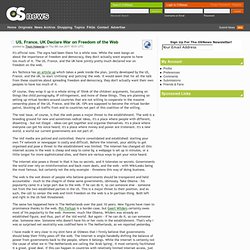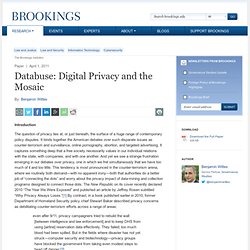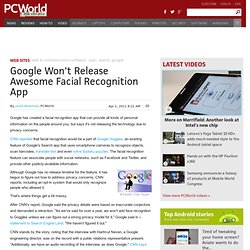

Tracking. Internet Privacy: Resist the Temptations of the Cloud! - SPIEGEL ONLINE - News - International. The World Wide Web, developed by Tim Berners-Lee in 1990 as a system for publishing and viewing information, is slowly being transformed into a system of remote computing.

It will store your data, and data about you, often limiting your access to it but allowing the Federal Bureau of Investigation (FBI) access at any time. It will do your computing for you, but you cannot control what it does. I Flunked My Social Media Background Check. Will You? PC rental store hid secret spy hardware in laptop, suit says. High performance access to file storage A Wyoming couple has filed a federal lawsuit claiming a computer they purchased came with secret spying hardware that allowed the seller to monitor their every move.

According to the complaint, Brian and Crystal Byrd first learned of the snoop device when they received a visit at home from a manager of the local Aaron's rent-to-own store falsely claiming they hadn't made required payments on their Dell Inspiron laptop. During the conversation, manager Christopher Mendoza said he had a photo of Mr. Byrd using the computer and as proof showed a picture that had been taken remotely using an off-the-shelf device called PC Rental Agent. “When Brian Byrd demanded that Mendoza explain how Mendoza had obtained an unauthorized photograph, Mendoza responded that he was not supposed to disclose that Aaron's had the photograph,” the complaint, filed on Tuesday in US District Court in Pittsburgh, Pennsylvania, alleged.
Social media brings out the snitch in all of us. Making websites accessible and secure. Website CAPTCHA technology used to protect sites from hackers, bots and spammers is making those same sites inaccessible to many potential users, according to a survey of 150 typical online forums and other sites.

Details of the findings are reported this month in the International Journal of Web Based Communities. CAPTCHA stands for "completely automated public Turing test to tell computers and humans apart. " These are computer-generated checks that attempt to determine whether a visitor is a legitimate user or a potentially malicious computer script favoured by hackers and spammers. They commonly take a question and answer form or ask users to enter characters in an obfuscated image of text. Securebook - Android Market. Securebook allows you to hide secret messages in your Facebook posts or Tweets that only your friends can read.

Mobile Location Privacy a Hot Topic on Capitol Hill. An effort to ensure consumers know how their mobile location data is being used and shared is underway on Capitol Hill, with a bipartisan bill now making its way through Congress.

Called the Geolocation Privacy and Surveillance (GPS) Act, the bill was written by Sen. Ron Wyden (D-Ore.) and Rep. Jason Chaffetz (R-Utah). The bill was simultaneously introduced in both the House and Senate today. US, France, UK Declare War on Freedom of the Web. It's official now.

The signs had been there for a while now. Brazilian police to use 'Robocop-style' glasses at World Cup.
TEDxObserver 2011 video: Cory Doctorow. Anonymity has real value, both in comments and elsewhere. Databuse: Digital Privacy and the Mosaic. The question of privacy lies at, or just beneath, the surface of a huge range of contemporary policy disputes.

It binds together the American debates over such disparate issues as counter-terrorism and surveillance, online pornography, abortion, and targeted advertising. It captures something deep that a free society necessarily values in our individual relations with the state, with companies, and with one another. Google Won't Release Awesome Facial Recognition App - PCWorld. Google has created a facial recognition app that can provide all kinds of personal information on the people around you, but says it's not releasing the technology due to privacy concerns.

CNN reported that facial recognition would be a part of Google Goggles, an existing feature of Google's Search app that uses smartphone cameras to recognize objects, scan barcodes, translate text and even solve Sudoku puzzles. The facial recognition feature can associate people with social networks, such as Facebook and Twitter, and provide other publicly-available information.
Edit Your Browser's AutoFill or AutoComplete. Tom Guthrie wants to selectively remove the usernames, passwords, and other bits of text from his browser's AutoFill--or AutoComplete--feature.

I love the way that modern browsers automatically fill in these fields, although some fields I'd rather they left unfilled. I don't trust a browser with the password for a retail or banking site, and I'm certainly not happy when one offers to fill in my credit card number. And sometimes they want to fill in information that's out-of-date or just plain wrong.
Luckily, you can delete AutoFills. Here's how to do so in the current versions of Firefox, Chrome, and Internet Explorer: Firefox This one is very simple. Chrome Google's browser offers a couple of ways to do this, and has the best solutions of the three. The first and fastest way is to do exactly what I described above in Firefox. Electronic Privacy Information Center. Anonymity Online.